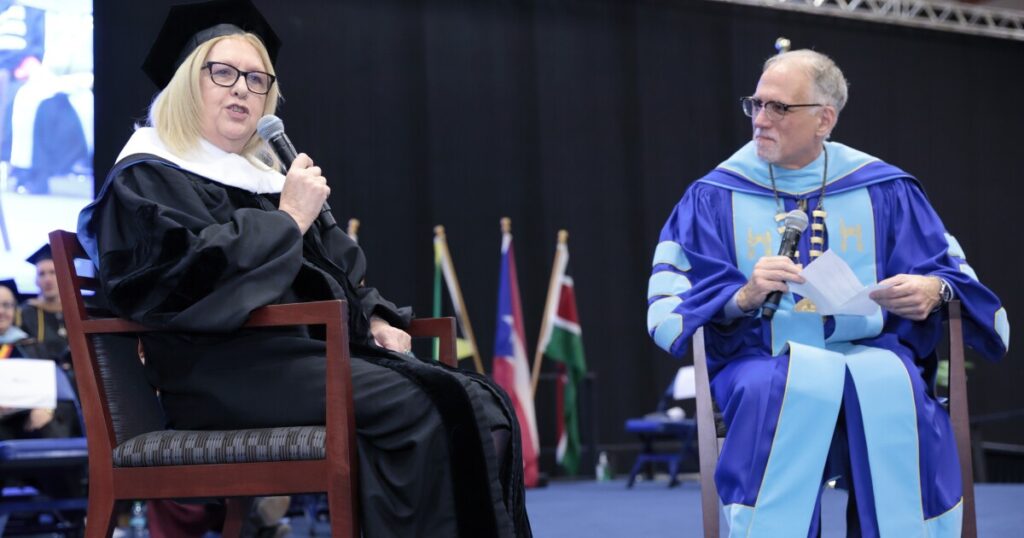In a year marked by numerous presidential visits to Northeast Pennsylvania, one event at Misericordia University stood out. It wasn’t a campaign stop, but rather a moment of reflection and celebration as Mary McAleese, Ireland’s former President, was honored at the university’s Winter Commencement Ceremony.
Mary McAleese, who served as Ireland’s eighth president from 1997 to 2011, was present not to rally for votes but to receive an honorary degree and impart knowledge from her extensive career. During her presidency, McAleese resided at Áras an Uachtaráin in Dublin, not the White House.
As the first President of Ireland hailing from Northern Ireland, McAleese felt a strong connection to Misericordia University, established in 1924 by the Sisters of Mercy, a Catholic religious order with roots in Dublin. “I’m an old Mercy girl,” she shared, reflecting on her early education with the Mercy nuns in Belfast, Northern Ireland. Serendipitously, McAleese encountered two fellow Belfast natives who attended her school, reinforcing her ties to the Mercy legacy.
‘A Little Chat’
Instead of a standard commencement speech, McAleese engaged in a conversational exchange with University President Daniel J. Myers, who described it as “a little chat.” This unique format marked the university’s 100th anniversary celebration.
McAleese recalled her educational journey, which included a transition to the Dominican nuns at age 11, praising them as “phenomenal educators” who motivated students like herself to aim high. She credited the free secondary education available during her school years for providing significant opportunities, stating, “They wouldn’t let us settle for our second best selves.”
Earl & Sedor Studios
/
Via Misericordia University
A Distinguished Career
McAleese’s career is a testament to her commitment to social justice and peace. As an attorney, journalist, and educator with a doctorate in Catholic canon law, she has been a formidable force in these fields. Growing up as the eldest of nine in Belfast during “The Troubles,” she witnessed firsthand the sectarian and political strife that shaped her community.
The period of conflict, which lasted from the late 1960s until the 1998 “Good Friday Agreement” facilitated power-sharing in Northern Ireland, left deep scars. McAleese recounted how her family was targeted, their home attacked, and her father’s pub firebombed, leading to a long struggle with depression for her father.
In response, McAleese dedicated her career to mending these wounds, co-founding organizations like Belfast Women’s Aid and the Campaign for Homosexual Law Reform. During her presidency, she sought to foster dialogue between Catholic and Protestant communities, despite resistance from some quarters.
Her efforts in “bridge-building” were epitomized by hosting Queen Elizabeth II for a historic state visit in 2011, symbolizing reconciliation between Britain and Ireland.

Earl & Sedor Studios
/
Via Misericordia University.
A Special Visit
McAleese’s visit to Misericordia University was made possible by the efforts of two Sisters of Mercy, both of whom have strong ties to Ireland. Sister Deirdre Mullan, originally from Derry, Northern Ireland, has lived in the U.S. for over two decades. Along with Sister Carol Rittner, they sought a distinguished Irish figure to honor during the university’s centennial year.
Both Sisters had prior connections with McAleese, but it was Sister Deirdre’s brother, Don Mullan, an Irish author and producer, who helped facilitate the introduction. Mullan’s work on Bloody Sunday, a tragic 1972 event, had already connected him to McAleese. With his help, McAleese agreed to participate within a day.
Sister Deirdre Mullan emphasized the importance of female leadership in Ireland, noting McAleese’s quiet diplomacy and her role in Queen Elizabeth’s visit as contributing factors to reconciliation. “Sometimes we underestimate the contribution of the female in Ireland,” Mullan stated, underscoring the importance of these efforts in healing historical wounds.
Mullan, reflecting on her own experiences during “The Troubles,” noted the progress since those tumultuous times. “Things are better than they were,” she acknowledged, while recognizing that further work remains to be done.





